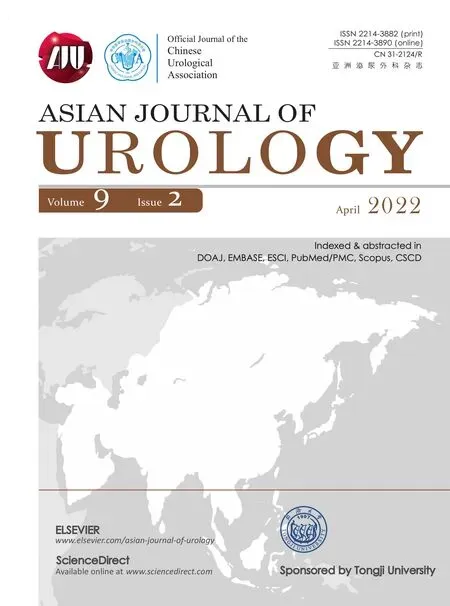Encrusted cystitis and ascites due to urethral calculus
Dear Editor,
A 55-year-old man presented with dyspnea and involuntary dribbling of urine for 1 month.He had history of straining during micturition and weak urinary stream for a year.On examination,he was disoriented and had abdominal distension.Ultrasound revealed marked ascites,pleural effusion,bilateral hydroureteronephrosis,and distended bladder with prostatic urethral calculus.A non-contrast computerized tomography scan additionally showed thickened bladder wall with florid mucosal calcification suggestive of encrusted cystitis and a 2.9 cm×2.5 cm calculus in the prostatic urethra extending to the bulbar urethra(Fig.1).His hemoglobin was 6 g/dL;urea and creatinine were elevated(114 mg/dL and 8.4 mg/dL,respectively);and the leucocyte count was 16.3×109/L.After initial resuscitation,ultrasound guided supra-pubic catheterization was performed.The urine pH was 8.4 while the microscopy revealed numerous pus cells,bacteria,and inorganic crystals.A nephrology consultation was taken and considering the clinical picture of encrusted cystitis,he started on intravenous vancomycin.He also received a session of hemodialysis.The patient died of cardiovascular collapse on the second post admission day.The urine culture report,obtained posthumously,revealed Corynebacterium urealyticum corroborating the diagnosis of encrusted cystitis.The strain was multidrug resistant and showed only sensitivity to teicoplanin and vancomycin.
Encrusted cystitis is an uncommon entity caused due to urinary infection with urea splitting bacteria especially.C.urealyticum,a kind of Gram-positive bacteria,is a skin commensal and causes alkalinization of urine by splitting urea to ammonia which in turn leads to deposition of calcium phosphate and struvite in the bladder mucosa.It is slow growing bacteria and can be missed on the routine urine cultures.The disease is characterized by calcification of the mucosa of the urinary bladder that can be diagnosed on cross sectional imaging,cystoscopy,and biopsy [1—4].The broad-spectrum antibiotics, especially teicoplanin and vancomycin,have been found to be effective against C.urealyticum.Acidification of urine and endoscopic resection of mucosal lesions have also been reported to be useful in the treatment of encrustation cystitis[4,5].
 Asian Journal of Urology2022年2期
Asian Journal of Urology2022年2期
- Asian Journal of Urology的其它文章
- Manuscript Guide for Authors
- Clinical features and management of ureteric stump syndrome:Singlecentre experience and contemporary literature review
- Impact of coronavirus disease 2019 on semen parameters
- Clinical lesson learned from genetic analysis in patients prior to surgical repair of hypospadias
- Factors influencing the degree of participation in surgical decision-making among Chinese patients with prostate cancer:A qualitative research
- Impact of delay from transperineal biopsy to radical prostatectomy upon objective measures of cancer control
